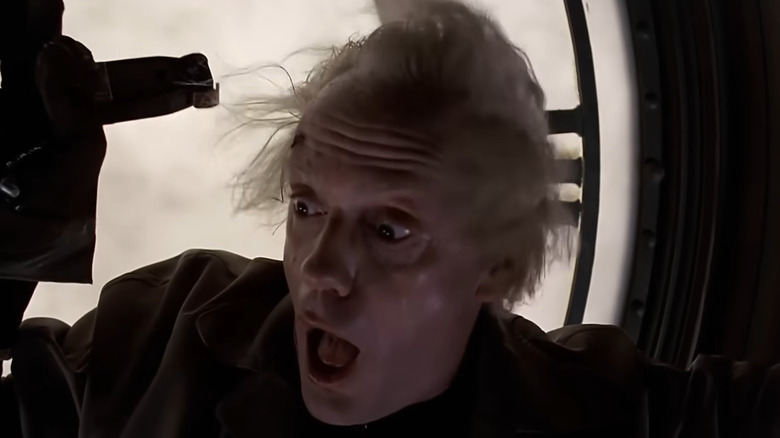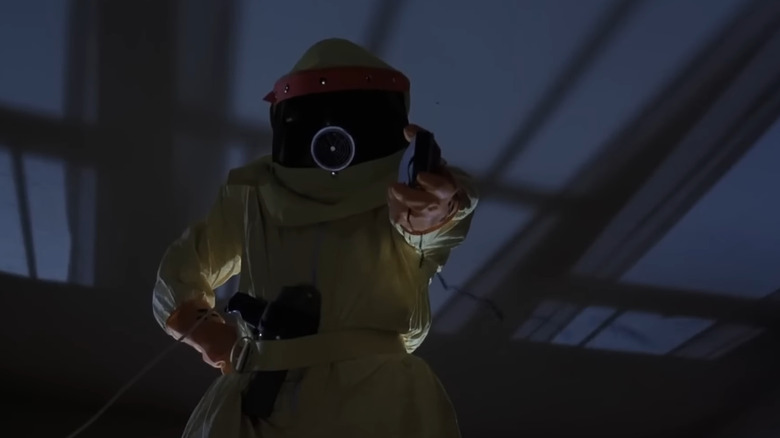Steven Spielberg Completely Rejected This One Studio Note On Back To The Future
It feels enormously fitting that the legacy of "Back to the Future" concerns looking back through the decades from whence it originated and being shocked by the sheer enormity of time. That's right, folks. The year is 2025, and Robert Zemeckis' acclaimed 1985 sci-fi comedy is celebrating its 40th anniversary. There's now an even bigger gap from today to when the film came out than the '85 planted Marty McFly (Michael J. Fox) traveling back to 1955. To commemorate the event in style, the film is not only receiving a brand new set of 4K Ultra HD steelbooks, but an oddly timed theatrical re-release in IMAX on October 31. Much like Steven Spielberg's "Jaws," which just celebrated its 50th anniversary milestone a few months back, "Back to the Future" has been one of those movies that feels as if it's always been with us.
No single piece of art can hold the monopoly over an entire concept like time travel, but there's a strong argument to be made for "Back to the Future" popularizing it in the pop culture zeitgeist. "Bill & Ted's Excellent Adventure," "Avengers: Endgame" and the entirety of "Rick & Morty" wouldn't exist in their current forms without it, with some going out of their way to directly reference it. It's become a blockbuster classic for a reason. The story of a California teenager accidentally taking a plutonium-powered DeLorean to 1955, where he attempts to rekindle his parents' teenage love affair, save his scientific mentor (the great Christopher Lloyd) from being murdered, and find a way back to the '80s sounds incredibly strange on the page, but up on the screen, it all makes sense.
"Back to the Future" is one of the most perfectly constructed blockbusters of all time, partly due to Bob Gale who co-wrote and co-produced every installment in the trilogy. He essentially built this iconic movie from the ground up with Zemeckis, and is just as responsible for its success. Gale saw plenty of developments across the project's history, including one that could have potentially tanked part of its reputation. Having Spielberg attached to the project with his company Amblin Entertainment turned out to be a real lifesaver. If not for the filmmaker's input on a single studio note, "Back to the Future" could have been saddled with an awful title, according to Gale (via Short List):
"During filming we had one executive keep asking us to change the title to 'Spaceman From Pluto,' a reference to the comic seen in the barn, which we ignored. Eventually he became too adamant of changing the movie title, he sent us a memo about it. Unsure how to handle it, we took the memo to Steven, who told us 'Don't worry, I know how to handle him,' before writing a letter back which said, 'Hi Sid, thanks for your most humorous memo, we all got a big laugh out of it, keep 'em coming.' Steven knew he would be too embarrassed to say that he wanted us to take the letter seriously."
Spaceman from Pluto doesn't have nearly the same ring as Back to the Future
The executive in question who delivered such a head-scratching suggestion is Sidney Sheinberg, who heralded Universal's film and television departments for over 35 years. Given that he was the one who gave a young Spielberg his industry boost at the company's television division, it makes sense that he'd listen and not push the matter any further. Great movies can have awful titles, and vice versa, but it's safe to say that we're all grateful "Spaceman from Pluto" didn't become the official title to such a cultural touchstone. It wouldn't have just been a bad title, but a wholly inaccurate one.
For starters, the comic book that Gale refers to doesn't actually say "Spaceman From Pluto," but rather "Space Zombies From Pluto." It can be seen when a frightened 1955 farm child holds it up to his family after discovering the crashed DeLorean in their barn as Marty, looking very much like a spaceman in his hazmat suit, steps out of the car. Even if it did say "Spaceman," it doesn't reflect the film's story or tone at large. It plays like the kind of in-universe movie someone from that era would make about the incident. The only other sequence in which Marty's yellow hazmat suit comes into play is a brief moment when he utilizes its intergalactic-looking identity to his advantage.
The nerdy George McFly (Crispin Glover) says that nothing on this planet could change his mind about not asking Lorraine Baines (Lea Thompson) out to the school dance. Marty figures this is the perfect chance to play on his father's affection for sci-fi and wakes him up in the middle of the night with some Van Halen music while wearing it. He hilariously performs sci-fi reference Mad Libs by declaring himself as an extra-terrestrial from the planet Vulcan named Darth Vader. In the finished film, that's all it really takes for George to hop on board Marty's crusade.
There also exists an extended bit of the nighttime interaction in which Marty threatens his father's younger self with a hair dryer "heat-ray." He even throws in another "Star Trek" reference for good measure by calling himself a Supreme Klingon. The bit ends with Marty chloroforming George and meeting Doc Brown (Lloyd) outside, and while you can see the vision of what was previously there, trimming it down makes the most sense. The hard cut from the Vader line to George excitedly running down the street gives the joke its greatest impact. You can see some remnants of the deleted bits in the film, however, as the Van Halen tape is used throughout the scene. That's why you'll notice Marty's hair dryer disappearing between shots.
"Back to the Future" is set for a theatrical re-release on October 31, 2025.

